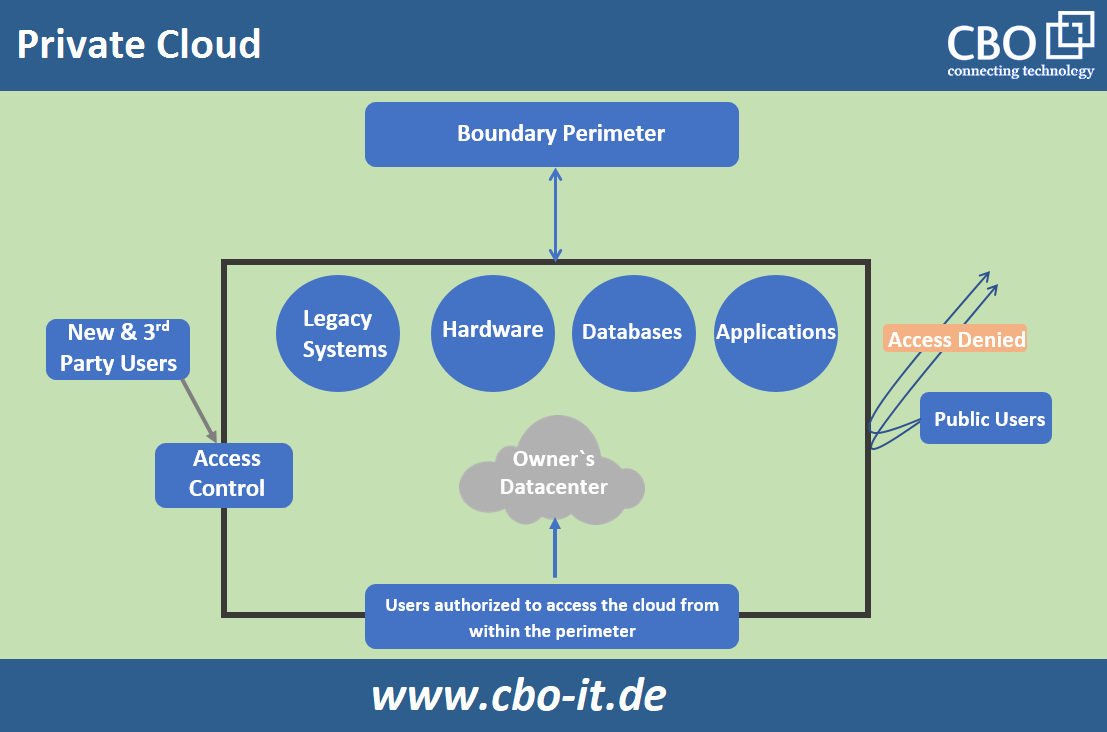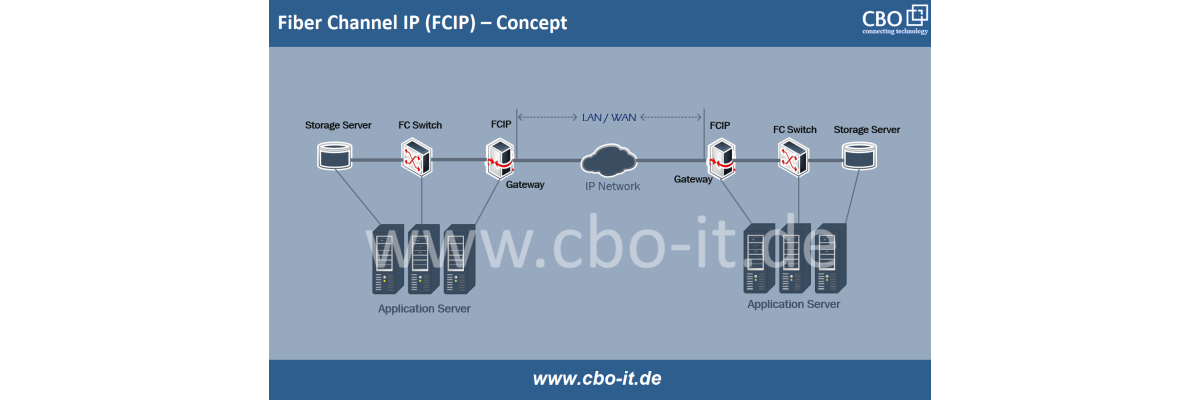With the growth in technology, reliance on cloud computing is increasing. According to the demand of the small, medium, and large enterprises, service providers are offering various cloud computing services. The most commonly used types of cloud models are:
• Private cloud
• Public cloud
• Hybrid cloud
Out of the above-mentioned cloud computing models, most users prefer public and private cloud-based solutions. So, to know which one is the better option to adopt, let's look at the comparison of both models by going through their advantages and disadvantages in detail.
Private Cloud

A private cloud is a computing service delivered to a particular company. This service is provided over highly protective and reliable, redundant communication channels. The customer's information routing through the network and stored on the networked storage devices remains inaccessible to the general public. Private cloud services are not cheap, and the services offer maximum flexibility and availability. Following are some famous names that offer private cloud services;
• Dell
• Packard Enterprise (HPE)
• IBM
• Oracle
• AWS
• Google
• Microsoft
It is essential to know that Microsoft, Google, and AWS are also famous for their public cloud services.
Benefits of Private Cloud
Highly secure and efficient: As a single company provides this service, they take care of customers' data by providing high-quality service, utmost security, and control over data. We have seen very few hackers and crackers intrusions into private cloud networks.
Complete authority over devices: Private cloud is most suitable for customers who want complete control over their hardware devices and software infrastructure. The level of control private cloud offers is unimaginable with public cloud services.
Customization and low latency: In private cloud networks, exists no multitenancy problems. Thus, it enables the users to select the devices of their choice with greater efficiency. Moreover, in private clouds, you can expect zero latency.
Less regulations: Subscribers of the private cloud networking models are not forced to comply with the complex regulations of the cloud service providers.
Drawbacks of private clouds
Not cost-effective: despite having a lot of benefits, the private cloud service providers charge a considerable amount of money for the installation and maintenance of the hardware and on account of staff training. In this model, the customer pays for everything, including from acquiring the hardware to its installation and maintenance.
Extensive access control: In this model, the opportunities of sharing services and resources with other organization and external users remains minimum. In addition to this, it is difficult for mobile users to access the private cloud.
Complicated to manage: The organizations that opt to go with private cloud network services need to invest extensively to construct a reliable hardware and software infrastructure. The construction of a private cloud network is only one phase, but continuous resources and efforts are pored for maintenance and monitoring. All these things require specialized human resources and a lot of cash stream.
Public Cloud
.png)
As the name indicates, it is a cloud computing service provided by the internet data center. These services are openly available on the internet, and any user from any part of the world can quickly get access to it at any time. Like the private cloud model, the public cloud model is also based on advanced technology and can do a lot of jobs at a time by providing ease to the user. Some amazingly featured public cloud organizers or providers are:
• Amazon Web Services (AWS)
• Alibaba Cloud • IBM Cloud
• Oracle Cloud
• Google Cloud Platform (GCP)
• Microsoft Azure
Advantages of Public Cloud
Extensive flexibility: With time and according to the growing user needs, more resources can be allocated to the account of a public cloud network service subscriber. Most service providers offer automatic scaling – an add-on and value-adding feature that enables users to put their private cloud network operation on Auto-Pilot mode.
It's a cheaper option: Using these services, you can deploy and maintain a cloud-based, always accessible IT infrastructure without investing in dedicated hardware and software. Industry leaders offer private cloud networks with large data centers. That's why public cloud networking products are available at low prices, and you can always get a customized one. Being a public cloud subscriber, you won't pay anything for installing and maintaining hardware back in the data center.
Straightforward management: Organizations can easily maintain all the cloud-related tasks cost-effectively because the service provider takes care of all the complicated engineering and maintenance tasks. As discussed earlier, public cloud subscribers can sit back and relax by opting to go with the auto-scaling feature.
Drawbacks of public cloud
Vulnerability: The use of the public cloud brings more security threats, and it does not guarantee the customers the protection of data. So, public cloud networks can sometimes become soft targets for hackers and crackers, and even a single breach into a public cloud can devastate multiple businesses.
Although, most public cloud operators maintain a robust cyber security regime to keep their network security effective. Still, it is not wise to opt for a public cloud, especially for enterprises that handle sensitive information.
Laws and regulations: Different rules and regulations exist regarding data storage and retrieval in different parts of the world. In the case of Europe, certain types of data cannot be stored offsite, and that's why a public cloud network can't be the solution. Whereas, in the case of a private cloud, you as a subscriber get more liberty and choices.
Performance Issues: Public cloud networks are shared by many entities. Due to many users on a single network, congestion issues are common that badly affect operational activities. Extensive sharing of software and hardware resources can make the subscriber more prone to performance issues, especially during peak time slots.
Comparison of private cloud and public cloud
We have discussed some basics about the private and public clouds, so it is better to learn about some of the key differences between these two famous cloud network models! the following exhibit shows what makes public and private networks different from one another!
.png)
Hybrid Cloud
.png)
From the above discussion, when can conclude that both models have their advantages and disadvantages? How is it if a third model to use can provide qualities of both the cloud models in a cost-effective manner? Yes, indeed, there is a third model termed as hybrid cloud and contains the features of both private and public cloud along with extra features that are not present in either model. Like the public and private models, the hybrid cloud model has advantages and limitations. Let's have a look at them at a glance.
Benefits of hybrid cloud are;
• Mixed features of private and public model
• To maintain IT workload, the firm can use a private model while maintenance of infrastructure can be done by public cloud
• Cost-effective
• Easy to install
• No breach of data
Being neutral, there are many limitations of hybrid cloud such as:
• Difficult to maintain
• Highly complex integration
• Required professional training of staff
• Difficult to protect
Concluding thoughts…
Finally, all cloud networking models have their advantages and disadvantages. There is no single model to meet all the demands of the customers. The most important consideration of the company before choosing a model is the security of the data that the private cloud model meets. On the other hand, the economically public cloud model is much more viable than the private and hybrid cloud models. Hence, the selection of a cloud model entirely depends upon the requirement of the organizations. You can enjoy various benefits of the private cloud by opting for a hybrid cloud.
However, for nurturing businesses that cannot pump a lot of funds into their IT infrastructure, the availability of customizable, flexible, and scalable public cloud networks is less than a blessing!
 English
English
 Deutsch
Deutsch
 Espaniol
Espaniol










